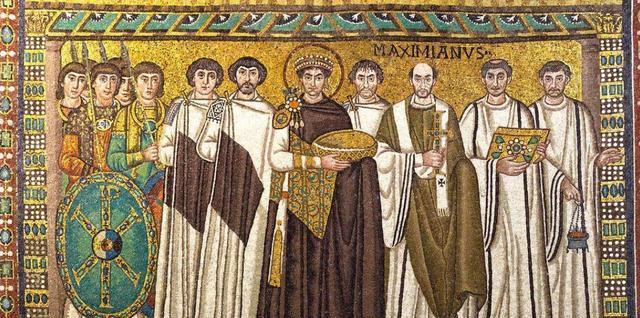Fifteen hundred years ago, a peasant's child was born in Skopje, Macedonia, southeastern Europe. Later, he was adopted as an adopted son by his uncle, The Eastern Roman Emperor Justinian I, and was gradually groomed to become the heir of the Eastern Roman Empire, the famous Justinian I.

To tell the truth, Justinian I took the throne from his uncle, but he also accepted the unbearable mess in his uncle's hands. How bad is this mess? Earlier, the Eastern Roman Empire and the Persian Sassanid Dynasty in the east fought another war, and it seemed that they could not fight, and the Empire had no money. You can't afford to lose, and if you lose, your hometown will be robbed by the Persians, so what to do?
On the side of the young and vigorous Justinian I, he could not change the way, so he had to empty the treasury and lose more than 3 tons of gold to the Persians in exchange for the Persians' retreat, after all, Justinian I had a more ambitious dream: to launch an expedition to the west and restore the glory of the Roman Empire that originally crossed Eurasia and dominated the Mediterranean!
People always have to have dreams, in case they come true. But this grand dream made Justinian I a reality within a few years, and it took him less than 20 years to almost restore the main territory of the Roman Empire, and the Italy, Spain and North Africa that the emperors lost were all returned to Justinian I.
But just when Justinian I was victorious and began to be complacent, the mysterious plague began to appear.
Initially, the plague caused by the plague bacillus broke out in the large cities of Egypt in North Africa, and soon showed its powerful lethality: Alexander, the gateway to the Mediterranean, as a Eurasian transportation hub, almost instantly changed from a large port to a dead city.
Then, with the help of the mysterious rats, the plague bacillus boarded a ship to all parts of the Mediterranean, and spread the plague throughout the empire, and the denser the denser the city, the more violent the disaster.
On the Mediterranean coast at that time, the capital of the Eastern Roman Empire, Constantinople, was the premier international super-metropolis, with a population of one million, but it killed 400,000 of them in half a year, and it is said that the specially excavated pit could not hold the body, only the sea burial, and the pus that oozed out of the sea burial of the body had yellowed the entire strait.
Even Justinian I, who lived in seclusion in the palace, contracted the plague. Although he recovered shortly thereafter, the clergy had begun to consider this a "divine punishment" and directly questioned his great achievements.
And no matter how much the clergy questioned it, no matter how much they emphasized that this was a "heavenly curse" caused by conquest and "disbelief in God", the plague still ran rampant in the territory of the Eastern Roman Empire for three years, and this was not the end. Thirteen years later, however, the plague bacillus returned, once again sweeping through the Eastern Roman Empire with a wide variety of pathogens, large and small.
This time, the already fragile empire could no longer hold back. Before the plague, the Eastern Roman Empire had a population of more than 40 million, and after the plague, only 26 million remained, women lost their fertility in large numbers, the number of soldiers dropped from 650,000 to less than 150,000, and the fiscal revenue was only 40% of what it was before the plague...
The "Justinian Reconquest", which had not been destroyed by any war, was thus crushed by two ensuing plagues. On the eastern shores of the Mediterranean, in Italy, and in Western Europe, the Eastern Roman Empire had to retreat again and again, losing its third-largest cities, Antiochus, Italy, and Greece.
But even so, the Plague Demon was reluctant to let go. After the death of Justinian I, the plague bacillus continued to attack the Eastern Roman Empire and the Mediterranean periphery many times, and by 599, when the last plague ended, the population of the Eastern Roman Empire was less than ten million people, and there was no need to talk about "restoring the glory of the past".
Since then, the Eastern Roman Empire has also become more and more "Hellenistic" and has become unable to deal with foreign wars... The Persians, the Slavs and visigoths, as well as the Lombards, together did not crush the mighty empire, and were nothing more than a toy that was about to collapse in the face of the plague.